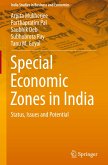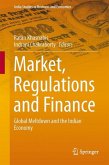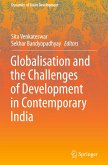This book presents research that applies contemporary monetary theory and state-of-the-art econometric methods to the analysis of the monetary and financial aspects of the Indian economy and the impact of monetary policy on economic performance. Indian monetary policy has attracted significant attention from Indian and international macroeconomists over the last several years. Interest in how monetary policy influences economic performance and how monetary policy is conducted in India is growing. The prospects for further financial sector reform and ongoing inflation in India have sparked new interest in the role of money and monetary policy in India among economists, policy makers and students alike. The book should also interest economists outside India because it studies monetary economics in a major emerging market economy and makes advances in the analysis of how financial market imperfections and structural constraints influence the effects of monetary policy.
"By framing the issues related to monetary policy of India in a class of microfounded models, the book brings the analysis closer to contemporary macroeconomic thinking. ... the volume successfully manages to present a detailed analysis of issues concerning monetary policy design in an emerging market economy like India based on contemporary macroeconomic theory. It certainly should become an essential reader for everyone interested in the macroeconomic policy of India: students, teachers, and policymakers alike." (Parag Waknis, Economic and Political Weekly, Vol. 53 (28), July, 2018)
"The book should be required reading for those observing India's macroeconomy, as well as an essential possession of those who are involved in making policy for/ dependent upon India's macroeconomy. The essays do not get lost in history, but thoroughly ground current Indian macroeconomic developments in up-to-date economic theory; they identify where the theory may be inapplicable to Indian conditions, and in some cases effectively demonstrate how that problem can be overcome." (Mihir Sharma, Business Standards, January, 2018)
"The book deals with various aspects of monetary policy in India viz. its formulation, implementation, regulation, transmission and challenges. It makes for an interesting read, especially for practitioners, economists, policy makers and students of monetary policy. The issues covered in the book are relevant for other developing and emerging market economies." (B. L. Pandit, Indian Economic Review, December, 2017)
"The volume edited by Ghate and Kletzer is perhaps the first attempt ... to bring together a richer set of New Keynesian analyses of the Indian economy. It should thus be read by policymakers, monetary policy analysts, academics and economics students. ... The volume edited by Ghate and Kletzer is important, and needs to be read, because of its insights into how the RBI can give more empirical and theoretical heft to its policies in this new era." (Niranjan Rajadhyaksha, Livemint, livemint.com, May, 2017)
"The book should be required reading for those observing India's macroeconomy, as well as an essential possession of those who are involved in making policy for/ dependent upon India's macroeconomy. The essays do not get lost in history, but thoroughly ground current Indian macroeconomic developments in up-to-date economic theory; they identify where the theory may be inapplicable to Indian conditions, and in some cases effectively demonstrate how that problem can be overcome." (Mihir Sharma, Business Standards, January, 2018)
"The book deals with various aspects of monetary policy in India viz. its formulation, implementation, regulation, transmission and challenges. It makes for an interesting read, especially for practitioners, economists, policy makers and students of monetary policy. The issues covered in the book are relevant for other developing and emerging market economies." (B. L. Pandit, Indian Economic Review, December, 2017)
"The volume edited by Ghate and Kletzer is perhaps the first attempt ... to bring together a richer set of New Keynesian analyses of the Indian economy. It should thus be read by policymakers, monetary policy analysts, academics and economics students. ... The volume edited by Ghate and Kletzer is important, and needs to be read, because of its insights into how the RBI can give more empirical and theoretical heft to its policies in this new era." (Niranjan Rajadhyaksha, Livemint, livemint.com, May, 2017)








